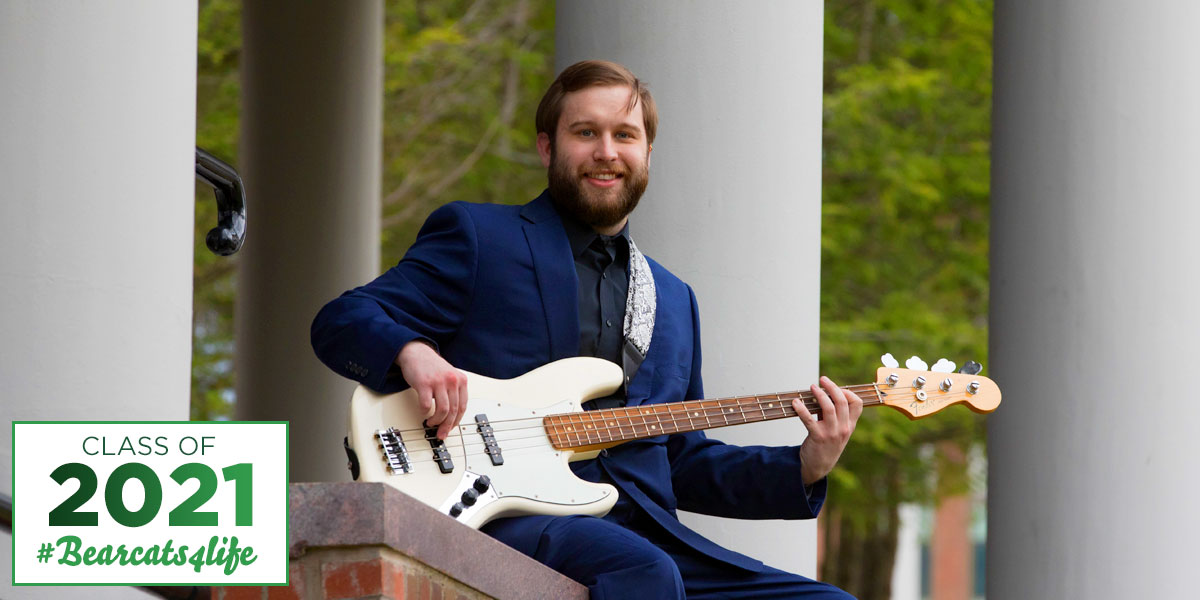Commencement 2021 profile: Benjamin Palmateer
Ben Palmateer followed his passion and is composing a future in music

Some years from now, you may hear a piece of music that stays with you. Perhaps the lyrics will speak to your life, perhaps some elusive combination of chords and rhythm will draw you in for a reason you can’t quite explain.
And perhaps that song will come from the talented pen of Benjamin Palmateer, who is graduating this May with his master’s degree in music composition.
Piped through grocery stores and dental offices, music is ubiquitous in our lives. Yet it’s also innately mysterious: No one knows precisely why human beings are drawn to patterns of sound, pitch and rhythm. That mystery is part of what draws Palmateer to composing.
“I think it’s such a unique way of putting someone’s own identity into sound. It’s such an abstract concept and, for some reason, people enjoy it a lot,” he said. “That’s always fascinated me.”
Originally from Saratoga Springs, Palmateer also completed his undergraduate degree in music at Binghamton University and stayed on for the master’s program. That wasn’t always the plan.
When applying to college, Binghamton didn’t have a particularly strong pull. It was close to home and a SUNY school, and that was enough.
He initially majored in chemistry and political science, thinking that they were surer bets than his real passion: music. But while pursuing his bachelor’s degree, he faced an essential question: Would he really want to settle for a second-choice career and spend decades working at something he didn’t love?
While the people in his life expressed support, he could sense that some questioned his choice.
“You could tell in some people’s faces that they were like, ‘What are you doing? You’re not going to be able to do anything,’” he said. “But I just smiled at them.”
After that decision, a different college experience began to unfold.
During his sophomore and junior years, he played in campus bands and won the Underground’s Battle of the Bands competition two years in a row. Playing for a huge crowd of his peers was a unique experience that added fuel to his passion for music, he said.
His professors provided encouragement and support. Associate Professor Daniel Thomas Davis and Associate Professor Christopher Bartlette have been ready mentors, but they weren’t the only ones.
“The entire music department really cares a lot about the students and how they’re doing, both in and out of class,” Palmateer said.
When it came time to consider graduate school, he considered other options. He had come to love Binghamton, however, and decided to stay.
“I didn’t really expect to love it as much as I did, because you don’t usually think of Binghamton as a music school. But the faculty are amazing and I realized that I could learn a lot more from them,” he said of his decision to stay at Binghamton for a master’s degree.
A future in music
When it comes to performing, Palmateer is primarily a vocalist, but has also played bass guitar since joining a friend’s band in middle school. He keeps other instruments around for composition purposes as well, including keyboards and a cello. Singers and musicians from a range of styles inspire him, from rap’s Kendrick Lamar and Vince Staples to modern composers Jennifer Higdon and Julia Wolfe.
In his master’s projects, he found ways to integrate elements of pop music into classical music compositions. Going forward, he hopes to create compositions that do the same thing from the opposite direction, working elements of art music into more popular compositions. Think of it as chamber music with a pop sound, he said.
To teach the requisite skills, Binghamton’s composition program is hands-on; students write music for both campus groups and for performing ensembles around the country that do residencies at Binghamton, such as the Chicago-based Fifth House Ensemble.
The coronavirus pandemic altered plans, presenting both challenges and opportunities. The symphony orchestra was split into smaller sections to accommodate social distancing, for example, giving composition students the chance to write for these smaller groups. While in-person residencies halted, students were still able to work with music ensembles remotely.
“It’s a whole different type of experience. We have to coordinate how we’re going to record it because (the musicians) are all in different locations as well,” Palmateer said.
If his Binghamton experience were a song, Palmateer is now in the coda: that final run of notes indicating that the piece has come to an end. Other songs await. While he considered doctoral programs, Palmateer has decided to forego the PhD for now and try his hand in the field.
“Since I’m still so young, I really want to spend some time trying to be a musician in the world,” he said. “If I don’t give myself that shot, I think I would really regret it.”
He’s aware of the challenges such a choice entails; the rise of streaming services, for example, can make it difficult for new artists to earn revenue. He doesn’t mind having a day job — ideally something related to his field, like music journalism or something at a record label — to keep body and soul together. The rest of his time he will dedicate to composing and, ultimately, recording his work.
His experience at Harpur College helped lay the foundation for his future creative work, perhaps similar in some ways to a bass line structuring a musical score.
“My experience has been really positive. I found that the support that I get here is much, much greater than I expected to get at school,” he said. “If I had to do it over again, I don’t think I would have picked a different school because it’s been pretty close to perfect.”
